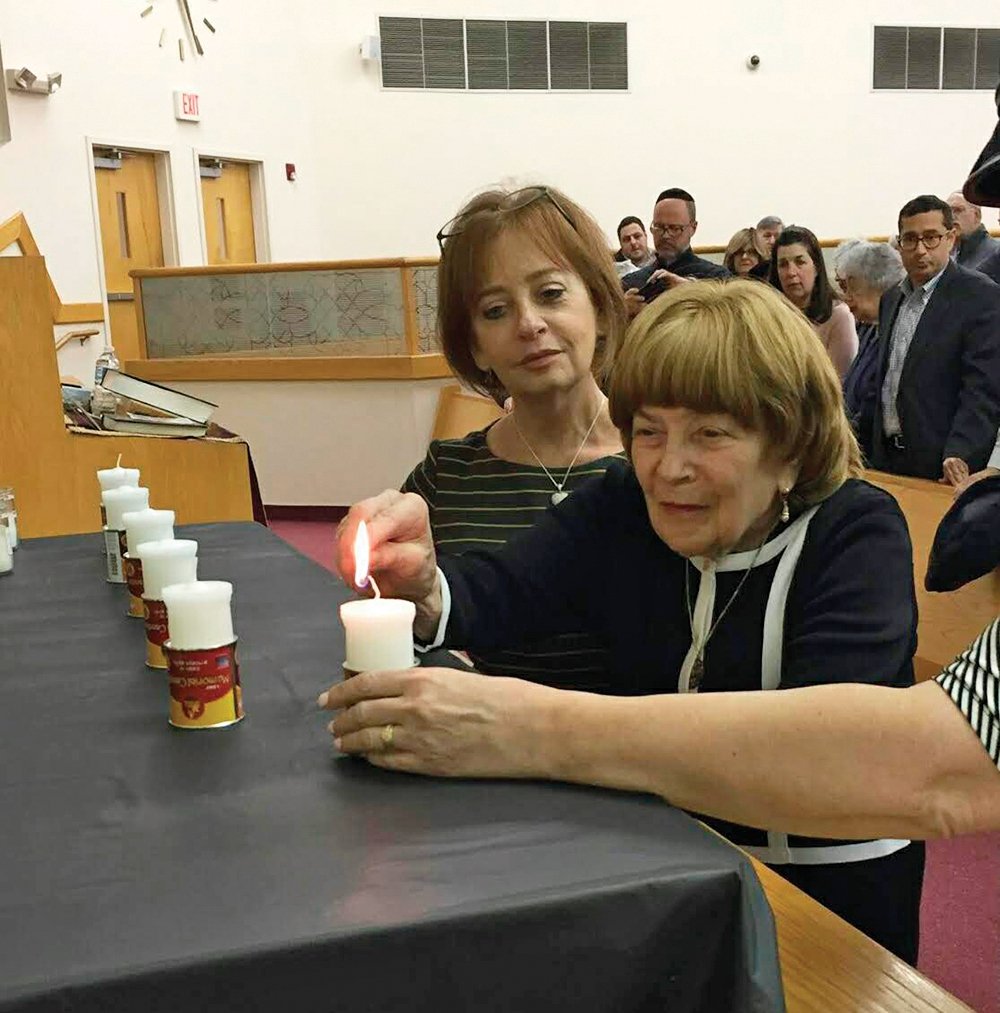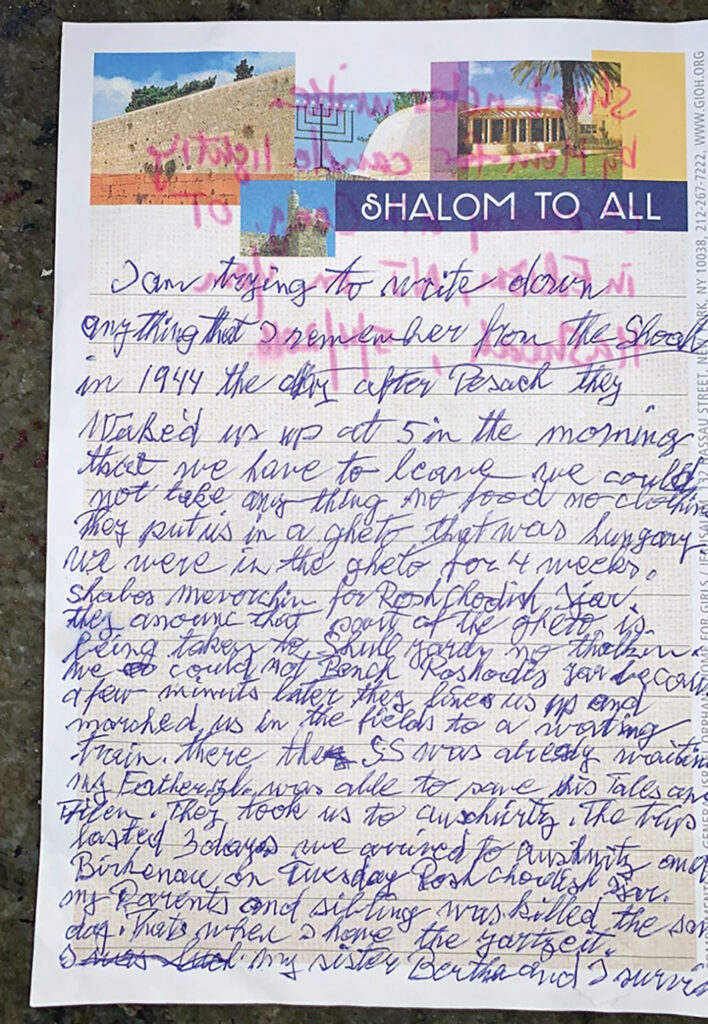
“I am trying to write down anything that I remember from the Shoah.”
With these words, my mother unknowingly authored her final Holocaust testimony, a shortened encapsulation of the destruction wrought by the genocidal Nazis upon her family, her town and our people. Her message is simple and understated, yet powerful and profound. I share here her handwritten note to perpetuate its preservation on Yom HaShoah, Holocaust Remembrance Day.
The words she wrote were recorded on an ordinary notepad, captured in her characteristic European hand to serve as talking points for the annual Yom HaShoah event she would be attending with us in 2018 at Congregation Ohr Torah in Edison.
On that night six years ago this week, and with me at her side, she was one of six Holocaust survivors who were each asked to light a memorial candle in remembrance of the 6 million Jews murdered during the Nazis’ reign of terror and industrial genocide that were to become known as the Holocaust in the English-speaking world, and as the Shoah in Hebrew.
I found the note among her papers in December 2020, several weeks after she passed away on Oct. 23, 2020. I remembered how she had scribbled her thoughts quickly, trying to hold onto the memories that threatened to elude her and seemed to jump one step ahead of her being able to capture them. I sensed her mind racing against time and more likely, against the ravages of age that she knew were encroaching on her ability to record, recite and retell her story.

The account she captured portrays her story in its most truncated form, a version collapsed into one single paragraph and reduced from the original, unadulterated and fully detailed narrative that had been told to my sisters and me throughout our childhood, adolescence and adulthood.
Unlike my father’s Holocaust testimony cut short with his untimely death at age 55 in 1981, my mother’s voice and witness to history blossomed and grew in confidence, as if to compensate for the loss of his. Over the years, her testimony was immortalized on video in 1996 by Steven Spielberg’s Shoah Foundation and with the Names Not Numbers program at the Rabbi Pesach Raymon Yeshiva (RPRY) in 2015. With time, she eventually grew eager to tell her experiences to her grandchildren and great-grandchildren, to our Shabbat guests and to our friends.
Looking back now, I sense that in the last years of her life she perhaps knew the day was approaching when her voice, and those of her fellow survivors, would be silenced by age, illness and mortality.
But what I suspect she never contemplated was the possibility that Holocaust denial could insidiously take hold and take over entire societies and history books so close to her own lifetime. The thought that there might come a day when testimonies like hers were in doubt, mocked and denied was unimaginable.
This very week marks exactly 80 years since my mother’s and father’s families were taken to respective ghettos from their homes, resulting in the murder of their families four weeks later in the gas chambers of Auschwitz. It is utterly inconceivable to me that with thousands of hours of survivor testimony recorded, and ultra-detailed record-keeping prized and preserved by the SS themselves, there are cultures today that view this tragedy as pure fantasy. Sadly, there are growing pockets of these deniers in our own society.
The Loop of Denial — the time it took for the Holocaust to be in doubt, for cultures to consider the 6 million to be an exaggerated figure or an outright lie — now seems quaintly generous and prolonged.
In 2024, the Loop of Denial has collapsed inward, imploding upon itself like the death of a star. The rapid retraction and shrinkage of this feedback loop mirrors the swiftness of rumors that race at internet speed around the globe, and lies that grow exponentially enabled by TikTok algorithms fueled by today’s uneducated elite and clueless consumers of content.
On the day of the Oct. 7 massacre just seven months ago, I stood in a bomb shelter in Jerusalem reciting the Yizkor memorial service for my parents, not yet knowing the details of the horror unfolding, but understanding that the repeated sirens, overhead rumble of military aircraft, and snippets of news that reached us were worrying and increasingly ominous.
The full tragedy revealed to us hours later would be met initially with a whiff of compassion by other countries, a fleeting blip of sympathy that seemed grudgingly granted by much of the world. With the terrorists recording their own crimes, broadcasting the massacre on social media, and phoning their parents to boast of the murders they’d just committed, the thought of denying the atrocities seemed out of the question.
Yet, on Day 213 with the shrunken Loop of Denial that is our 2024 reality, we are already there. Holocaust denial took decades to take hold. The massacres of Oct. 7 are in our immediate rearview mirror, yet it’s taken mere months or even weeks for the facts to be diminished, doubted and denied.
My mother’s words now seem prescient and prophetic: “I am trying to write down anything that I remember from the Shoah.” It’s almost as if she were racing against time for the facts to not only be retrieved while crisp in her own memory, but to hasten their communication outward before the truths of the remaining Holocaust survivors could be denied and silenced.
Seven months after the atrocities of Oct. 7 and 80 years after the expanding tragedy of the Holocaust finally reached my mother’s and father’s families in their respective homes in Hungarian-occupied Slovakia and Romania, I feel more than ever the obligation to speak out on Yom HaShoah.
As a child of two Holocaust survivors, my sisters and I grew up with a list of characteristically irrational aversions that were common to other children of survivors, the 2nd Gen soul sisters and brothers of my generation: the belching smoke of chimneys, the fires emanating by the gas pilot lights on oil refineries alongside the New Jersey Turnpike, the claustrophobia of speeding trains with crowded human cargo, the stylish wooden clogs that triggered flashbacks in my parents’ eyes, and even the guttural sounds of the German language itself. We were raised with reassurances of safety and distance from danger by our loving parents, yet were bred with generational trauma, just barely tamed under the surface to keep the sense of impending doom at bay.
“Never Again” was part of the lexicon, heightened by our innate knowledge of how serenity and safety could be swiftly upended. Only now we’re not the only ones who understand this — it’s become the universal truth of our time as waves of Jew-hatred lap at our feet and spread at 2024 warp speed. The message of today is undeniable: Never Again Is Now.
On Holocaust Remembrance Day, Yom HaShoah 2024, here you can see my mother’s note in her own hand or read her poignant words in my transcription below.
*************
I am trying to write down anything that I remember from the Shoah.
In 1944, the day after Pesach, they woke us up at 5 in the morning, that we have to leave. We could not take anything: no food, no clothing. They put us in a ghetto that was in Hungary. We were in the ghetto for 4 weeks. On Shabbos Mevorchim for Rosh Chodesh (translation: the blessing of the new month recited on the Sabbath before the new moon), they announced that part of the ghetto is being taken to the Shul yard. No Talking. We could not bentsch Rosh Chodesh because a few minutes later they lined us up and marched us in the fields to a waiting train. There, the SS was already waiting. My father was able to save his Tallis and Tefillin (translation: prayer shawl and phylacteries). They took us to Auschwitz. The trip lasted 3 days. We arrived to Auschwitz and Birkenau on Tuesday, Rosh Chodesh Sivan. My parents and siblings were killed that same day. That’s when I have the yahrzeit.
My sister Bertha and I survived.
#YomHaShoah #AmYisraelChai #NeverAgainIsNow









